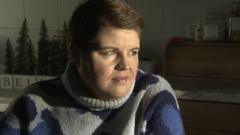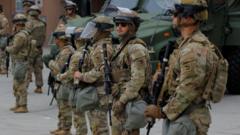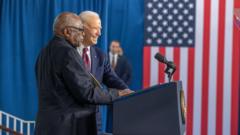As Ireland approaches its general election, a contrast emerges between the country's impressive financial statistics and the lived experiences of its citizens. Many voters feel disconnected from the nation's wealth, expressing concerns about inadequate healthcare, unaffordable housing, and the increasing cost of living. With rising discontent bubbling beneath the surface, the public sentiment poses a challenge for the ruling parties as they seek support.
Voter Sentiment in Ireland: The Illusion of Prosperity Amid Economic Growth

Voter Sentiment in Ireland: The Illusion of Prosperity Amid Economic Growth
Amidst reports of Ireland's economic success, voters express deep frustration over pressing issues like healthcare and housing, leading to discontent ahead of the upcoming elections.
Emma, a worried mother from County Donegal, encapsulates the frustration felt by many. Despite Ireland being one of Europe's richest countries, Emma's family battles long waiting periods for essential medical care, particularly for her children with complex health needs. "I hear we are one of the richest countries in the world, but I don't see it," she laments, reflecting a shared sentiment that has become prevalent among voters.
Local journalist Áine Ní Bhreisleáin highlights that while government officials assure citizens of a booming economy, the reality of a soaring cost of living causes concern. Alongside healthcare woes, housing remains a significant hurdle, with over 58,000 individuals on the social housing waiting list. Analysts suggest that Ireland requires the construction of 35,000 new homes each year to meet demand, but immigration has only exacerbated the problem, with 150,000 newcomers expected last year.
The issue is pressing in Donegal, known for its scenic beauty but often overlooked politically. Residents feel abandoned by the government, battling infrastructural problems, a lack of healthcare access, and the consequences of defective building materials causing serious damage to homes. The perception of inequality further fuels discontent, as Greg Hughes, a local radio host, notes concerns about prioritization of resources for asylum seekers over indigenous residents.
The division between the country's wealth and the needs of rural areas is stark. Voter Margarite expresses feeling "gaslighted" by politicians, perceiving a disconnect between economic data and daily life. Amidst the impending election, this wealth gap poses significant questions for the ruling coalition of Fine Gael, Fianna Fáil, and the Green Party, while prominent leader Sinn Féin may emerge as a major contender advocating for the public's urgent needs.
As votes are cast, the requirements for change stand clear: bridging the gap between economic success and the reality faced by Irish families. The electoral outcome may serve as a revealing indicator of the government's ability to address these critical issues moving forward.
Local journalist Áine Ní Bhreisleáin highlights that while government officials assure citizens of a booming economy, the reality of a soaring cost of living causes concern. Alongside healthcare woes, housing remains a significant hurdle, with over 58,000 individuals on the social housing waiting list. Analysts suggest that Ireland requires the construction of 35,000 new homes each year to meet demand, but immigration has only exacerbated the problem, with 150,000 newcomers expected last year.
The issue is pressing in Donegal, known for its scenic beauty but often overlooked politically. Residents feel abandoned by the government, battling infrastructural problems, a lack of healthcare access, and the consequences of defective building materials causing serious damage to homes. The perception of inequality further fuels discontent, as Greg Hughes, a local radio host, notes concerns about prioritization of resources for asylum seekers over indigenous residents.
The division between the country's wealth and the needs of rural areas is stark. Voter Margarite expresses feeling "gaslighted" by politicians, perceiving a disconnect between economic data and daily life. Amidst the impending election, this wealth gap poses significant questions for the ruling coalition of Fine Gael, Fianna Fáil, and the Green Party, while prominent leader Sinn Féin may emerge as a major contender advocating for the public's urgent needs.
As votes are cast, the requirements for change stand clear: bridging the gap between economic success and the reality faced by Irish families. The electoral outcome may serve as a revealing indicator of the government's ability to address these critical issues moving forward.






















